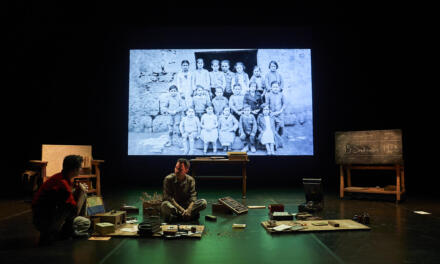Linger is a fitting title for a play that navigates the lasting implications of wrong choices on those who surround us. This world premiere, winner of the 2018 Premiere Play Festival and written by Craig Garcia, will be presented at Premiere Stages at Kean University from July 12-29. A family drama for the here and now, Linger also examines how social media can elevate a crisis and questions how well a family really knows each other.
Mike (Robby Haltiwanger) is a social 17-year-old boy who is looking forward to leaving his hometown for college and has positive relationships with his parents and younger sister, Summer. The night before the play opens, Mike attended a typical high school party, where he may or may not have brutally beaten and raped a classmate, Bobby, who is gay.
When he is arrested, the carefully constructed family picture begins to tear, yet most of the destruction seems to be regarding the parents, Maryanne and James. Parts of the play are focused on Summer, like when her classmates enact a vicious spiral of online bullying, but Mike ultimately gets left out. There are a few scenes that provoke empathy for him and while the final scene shows him trying to come to terms with what he has done, he reads as a shadow throughout the rest of the play. A closer look and development of Mike would provide an important piece of the puzzle–more insight. Audience members would also have a chance to judge Mike as a person if he was given more stage time and decide if deserves the empathy that is procured earlier.

Sarah Kathryn Makl as Summer and Robby Haltiwanger as Mike in the Premiere Stages production of Linger by Craig Garcia | Photo Credits Mike Peters
James (Michael Frederic) could also use more development. His character takes up a majority of the play, but he is either vehemently defending his son or trying to get the family to go on an overseas vacation together, but not much else. The audience never really gets to know him when he isn’t scheming or angry. And when he finally realizes that Mike is guilty, James turns on him in a matter of seconds, which seemed rash in terms of the lengths he went to ensure that his son was innocent.
These character discrepancies are to be expected in a new play and will likely improve with time. However, Maryanne (Danielle Skraastad), who reads as the main character, is an exception. She is wonderfully dynamic and strong-willed. Most importantly, she deals with the true gravity of the situation by telling her son the truth–that things will not go back to normal and that he’s going to have to deal with his actions for the remainder of his life. Even through all this, she manages to convey how much she loves Mike without words. Skraastad beautifully played the role and gave this story the meaning it deserved.
While this play has a longer running time than most, the action flowed smoothly and quickly; the intermission felt odd, especially since it halted the drama at a point where tension ran high. Eliminating the intermission in future productions would be beneficial to the piece by keeping audiences engaged and in the moment.
The social media aspect of this play is loosely intertwined throughout the plot, but its dangers and implications are always lurking somewhere in the background. A more creative representation of social media and technology would have added a physical dimension that could connect further with the audience while showing what Summer and Mike’s peers were posting and how deeply that affects them.

Robby Haltiwanger as Mike, Danielle Skraastad as Maryanne, and Michael Frederic as James in the Premiere Stages production of Linger by Craig Garcia | Photo Credits Mike Peters
Issues of family loyalty and technology can be difficult to navigate, especially when you throw in a hate crime, attempted suicide, mental health, and sexual politics. Garcia touches on each of these subjects to grab the audience’s attention, but he never goes into full detail about any. This ambiguity is a wonderful tactic meant for audiences to dwell on later. By not disclosing the full details of how certain events play out, Garcia makes it easy to explore different opinions surrounding these subjects and associate them with the play itself, making it more memorable and thought-provoking.
Linger is an uncomfortable play that brings up difficult subjects that many don’t discuss with their loved ones, which is what makes it successful. When we don’t discuss these subjects or pretend they don’t exist, whether it’s because we don’t want children to lose their innocence and naivety, or because it makes us feel uncomfortable, we end up further hurting those who matter most to us. Linger illustrates the consequences of this, advocates for educating children about dangers they will inevitably face, and questions if we can ever truly know those closest to us.
This post was written by the author in their personal capacity.The opinions expressed in this article are the author’s own and do not reflect the view of The Theatre Times, their staff or collaborators.
This post was written by Madison Parrotta.
The views expressed here belong to the author and do not necessarily reflect our views and opinions.


















